If you’re looking for a VPN with a focus on privacy and security, chances are that you’ve heard about NordVPN. This provider boasts an impressive array of security features that will not only keep your activities away from prying eyes but also protect your privacy.
Proton VPN follows the same steps, and although not the most popular option, it’s a provider that shouldn’t be underestimated. In fact, I think this is one of the most underappreciated providers on the market given its overall level of security, performance, and number of features.
7492 servers
118 covered countries
30 days money-back guarantee
10 simultaneous connections

6500 servers
112 covered countries
30 DAYS money-back guarantee
10 simultaneous connections
Having in mind that both providers bring their A-game to the table, we thought it’d be interesting to see which one is actually better. Thus, we crafted this Proton VPN vs NordVPN comparison just for you, in case you’re in doubt about which provider to go for.
Needless to say, we’ll compare all aspects of these two providers, we’ll see if they’re good for streaming or torrenting, and test their performance and security features. With that said, let this Proton VPN vs NordVPN comparison for 2025 begin – it will be a good battle!
Proton VPN vs NordVPN: Duel Recap
Today’s duel ended up with NordVPN’s win. The provider was better overall while costing less, making it the only sensible choice. Here’s an overview of the Proton VPN vs NordVPN duel and which provider won which rounds:
- Apps/Ease of Use: NordVPN
- Security/Privacy: Draw
- Streaming: NordVPN
- Speeds: NordVPN
- Torrenting: NordVPN
- Bypassing Censorship: NordVPN
- Server Count: Draw
- Customer Service: NordVPN
- Pricing: NordVPN
Proton VPN vs NordVPN: Apps & Ease of Use
Starting things off, let me talk about something that’s very important, and that’s device compatibility. NordVPN is known for providing native apps for all major platforms, such as iOS, Android, Linux, macOS, Windows, Fire TV, Android TV, and many others.
NordVPN even supports lots of different router VPN models and versions of firmware, making it extremely easy to set up on this device. Proton VPN follows closely. Its native clients are excellent and you can get this provider to work on pretty much every device.
However, its support for gaming consoles and routers isn’t the best, whereas, this is one of the strongest points of NordVPN. The latter even offers SmartPlay which you can use for streaming on your PS or Xbox consoles.
Regardless, Proton VPN strikes back with the number of simultaneous connections. It offers 10, while NordVPN gives you… well, 10. So, both providers have exchanged almost “equal” punches so far.
Proton VPN
The application of Proton VPN is one of the best-looking apps I’ve used. It looks almost identical regardless of the platform you’re using, which is great, as the learning curve between the devices is eliminated. Much like its rival today, it sports a huge world map in the middle.
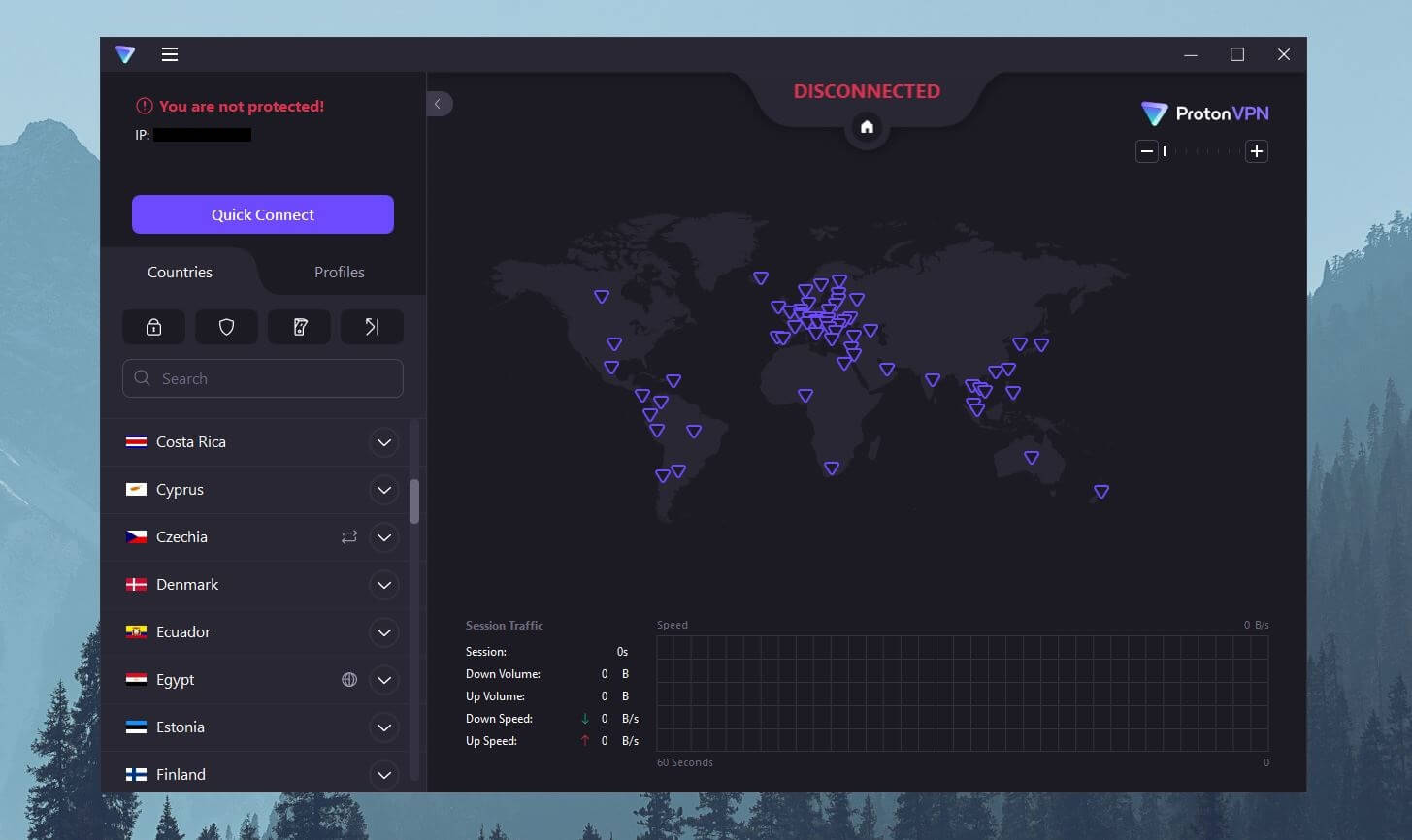
The world map, to be honest, looks like it’s from “AliExpress” as it’s colorless and isn’t particularly beautiful. Nevertheless, the server list is on the left, and all locations are listed from A to Z, making it easy to choose the one to your needs.
On the home screen, you can use the Quick Connect option to connect to the fastest servers, and above the server list, you can enable options like NetShield, Secure Core, Kill Switch, and Port Forwarding. In the Settings menu, things are quite simple.
You’ll find all VPN-related options in the Connection and Advanced sub-menus. Therefore, you don’t have to wander around through different menus to find different settings, as it’s the case in CyberGhost, for example.
All settings are clearly displayed and enabling/disabling them is done with a single mouse click. Finally, I should get back to the server list and mention that Proton VPN lets see which servers are maintained/repaired and can’t be used at the given time – I found this very impressive.
NordVPN
NordVPN recently updated its apps to make them look better and more modern. However, the essence of the apps remained the same, which isn’t all that bad. In this Proton VPN vs NordVPN duel, NordVPN’s world map looks way better and gives a better first impression.
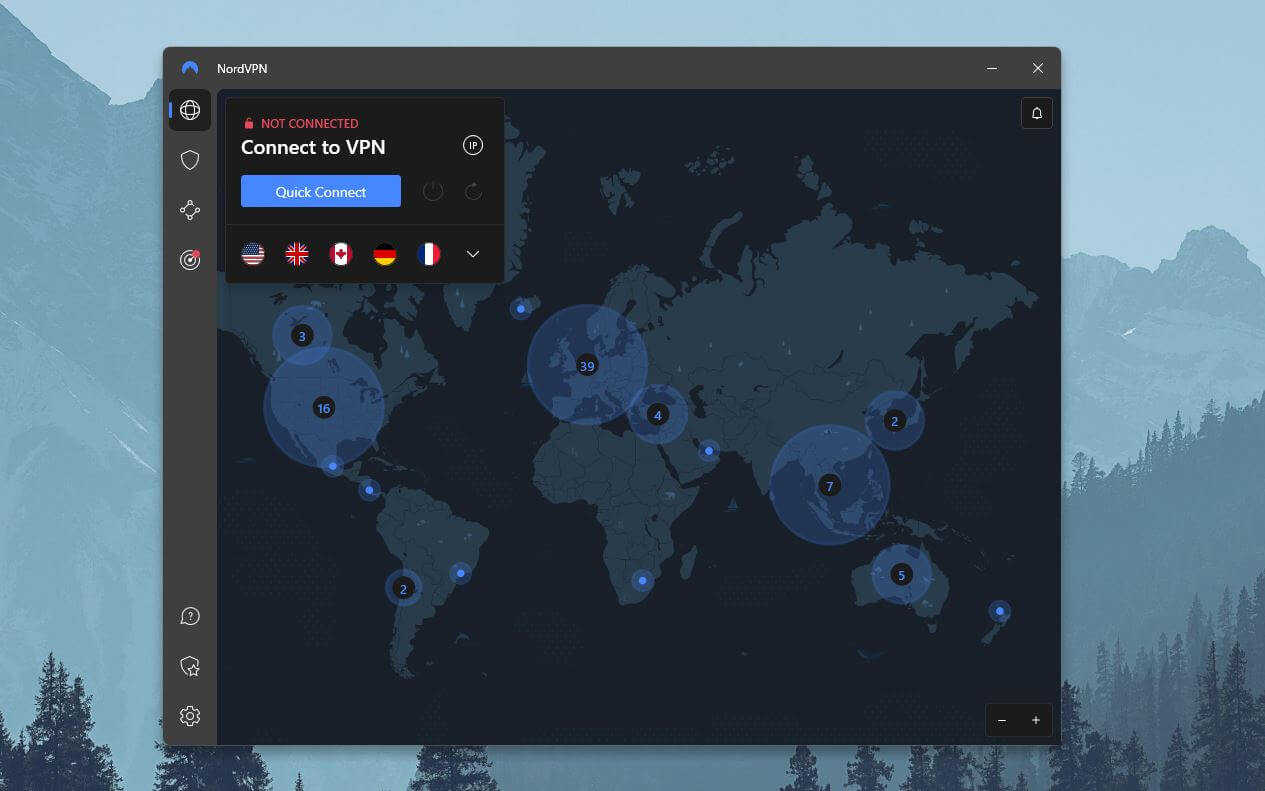
You can use it to connect to a server or unwrap the server list on the left. In the server list, you’ll see that countries are listed alphabetically, with dedicated P2P, Double VPN, and other servers above. Clicking on the Shield icon on the left opens the Threat Protection menu.
Underneath, you can find Meshnet, Dark Web Monitor, and the “Security Score” menu where NordVPN gives you a score based on how much you’ve secured your computer. These features aren’t available on mobile platforms yet, but since I mentioned them, the apps on mobile platforms are almost identical.
In the Settings menu, it looks like NordVPN listened to my criticism and made things MUCH simpler. Now, every feature has its separate menu and you can even enable dark or light mode! Not to mention that it’s easier to change your protocol in the Connection menu.
One more thing is that it’s now easy to enable obfuscated servers, as you don’t have to manually enable OpenVPN TCP to use them. Once you click on obfuscated servers, NordVPN will do that for you instead – good job.
Who Wins?
In this part of the duel, it’s extremely close. NordVPN offers better device compatibility and allows the same number of simultaneous connections as Proton VPN (10). Therefore, NordVPN wins this round.
Security & Privacy: Which One Is Safer to Use?
As said at the start of my NordVPN vs Proton VPN comparison, these providers place a huge focus on privacy and security. That’s obviously a good thing and makes this duel far more interesting. Let’s talk more about that and see what we’re up to.
Security Features
While premium providers are different in what they offer, some of them boast mandatory similarities that represent the base of a VPN service. No doubt, NordVPN, and Proton VPN have their share of similarities, which we’ll discuss now.
Both providers offer AES-256-bit encryption, IP/DNS leak protection, a kill switch, an ad-blocker, OpenVPN support, split tunneling, and the ability to use custom DNS servers. NordVPN has something called Double VPN while Proton VPN has Secure Core.
These are very similar features in the way that they route your traffic through multiple servers, doubling your encryption in the process. Proton VPN does a bit better job here, offering, as it routes your traffic through more locations instead of just two in NordVPN.
The last similarity has to do with servers. Both providers have RAM-based servers, which is mandatory for keeping their users safe and their information private.
What Are the Differences?
When talking about which provider is more feature-rich, I think NordVPN takes that title. It offers the aforementioned Threat Protection bundle that, when enabled, blocks malicious sites, stops web tracking, eliminates malicious ads, and protects your PC from infected files.
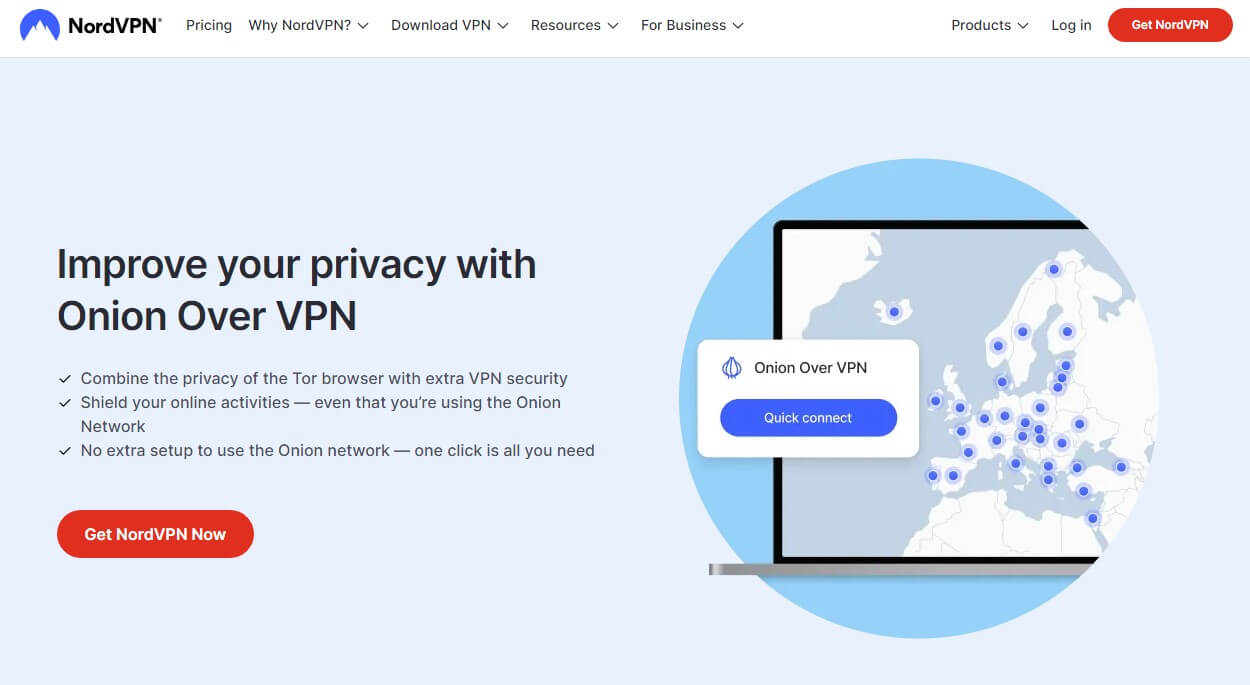
Meshnet is another great feature that lets you host or join secure virtual LAN parties for business or gaming purposes. And of course, there’s this Dark Web Monitor that’ll inform you if any of your sensitive data is publicly exposed online, letting you take appropriate action.
In addition, NordVPN offers a kill switch that can work on the system level but also on the app level, which you won’t see in other providers often. In terms of protocols, NordVPN has one big difference and that’s NordLynx, a proprietary WireGuard-based protocol.
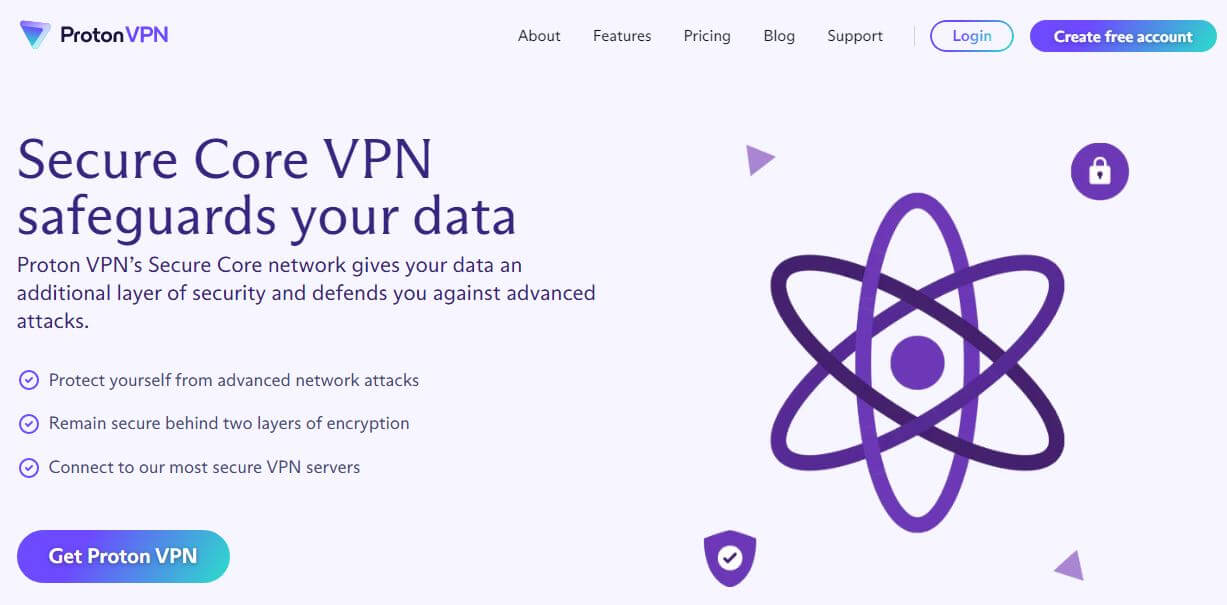
It’s way better than OpenVPN performance-wise, all while providing top-grade security. Proton VPN uses WireGuard instead, for example. This provider also has some unique features such as VPN Accelerator which should boost your performance – but we’ll see later.
Next, Proton VPN has port forwarding that will speed up torrenting and online gaming, but also something called alternative routing, which should help you bypass censorship in some countries – once again, we’ll test this feature later.
Is There a No-Logs Policy?
In this Proton VPN vs NordVPN test, we should talk about their logging practices. Thankfully, there’s not a lot to talk about as the logging practices of both providers are minimal. What’s more, both providers are based in privacy-friendly jurisdictions, although in completely different parts of the world.
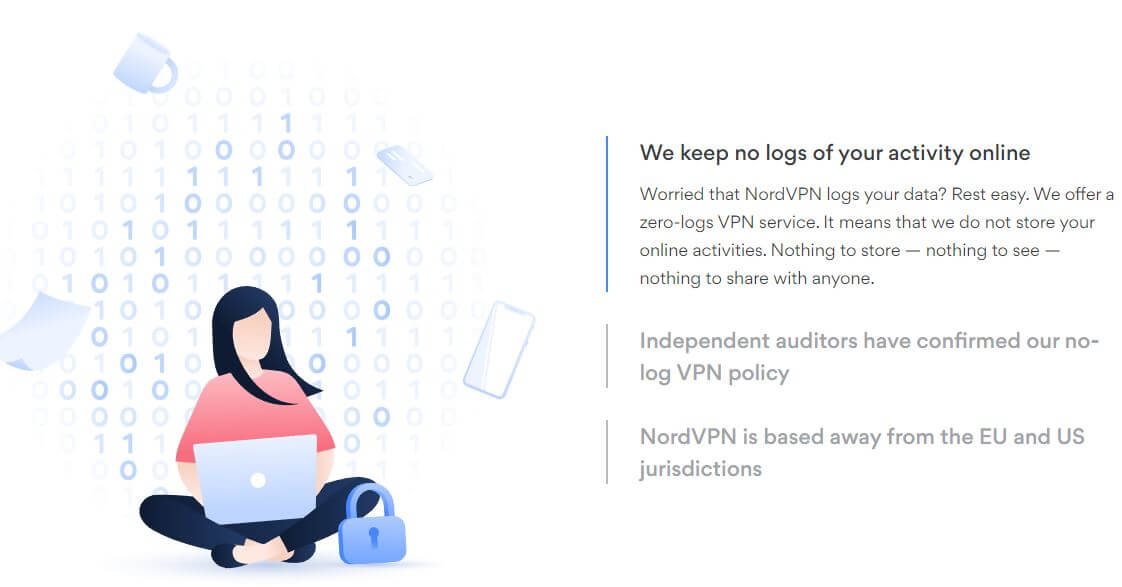
Proton VPN found its home in Switzerland, while NordVPN is based in Panama. Moreover, both providers have certified zero-logging policies, with NordVPN having TWO security audits from PricewaterhouseCoopers, adding to its trustworthiness.
When saying that they won’t store logs, it means not storing your IP address, incoming/outgoing traffic, metadata, timestamps, DNS requests, browsing history, geolocation, and other bits of information. The information they store is, once again, minimal.
On that list, we can find technical information needed for troubleshooting, server performance, crash reports, and other bits of information in an anonymized form. Since both providers use RAM-based servers, none of this information is kept for too long either way.
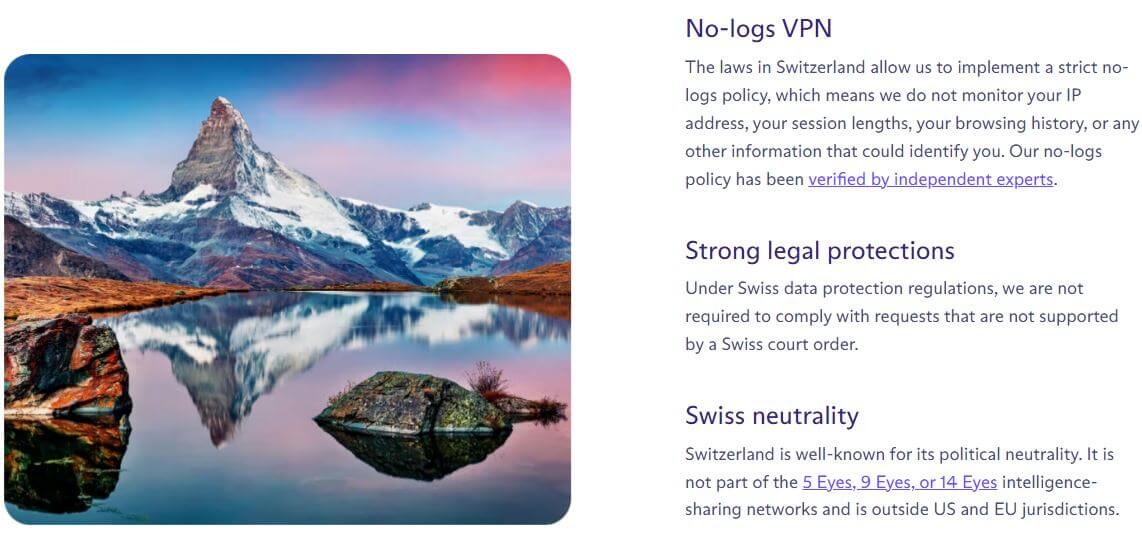
With every server restart, the information is automatically wiped clean, leaving nothing for the snoopers to find. Overall, neither of the providers will compromise your privacy by leaking your personal info to the public eye. And when I think about it, they’re very similar.
NordVPN is audited by PwC, an auditor from Switzerland, where Proton VPN is also based. This just tells us that we’re talking about two highly-secure providers with stringent no-logging practices – splendid! In 2025, NordVPN received another third-party audit from Deloitte.
Having 3 security audits in total, it’s clear that NordVPN’s reputation is rapidly growing. Deloitte also audited several other companies, including CyberGhost and Surfshark, so it’s a yet another reputable auditor in the VPN world.
Who Wins?
This was a tough battle, with both providers showing a high level of security. As they both offer some unique features and have third-party security audits, this round is, once again, a DRAW.
Proton VPN vs NordVPN Streaming Test
With the security part out of the way, I think it’s time we talk about streaming. NordVPN is already known as a powerful streaming VPN but is Proton VPN going to do well in this test? I think there’s only one way to find that out.
Netflix Test
As always, I’ll start off my Proton VPN vs NordVPN streaming comparison with Netflix. I test several libraries, such as those from the US, Canada, and Japan given their popularity among Netflix users. Bear in mind that I’m located in Eastern Europe, so I have no access to any of them.
With both providers, I connected to servers in the respective countries to see if they could unblock the aforementioned catalogs. Thankfully, the results were great and both providers managed to unblock every library I threw at them. NordVPN, however, ended up unblocking slightly more Netflix catalogs – 20, as opposed to around 10 from Proton VPN.
As NordVPN included plenty of virtual Indian servers, it could also unblock the Indian catalog, for example. In this comparison, Proton VPN, which has Indian servers couldn’t do that – sadly. However, we tested Surfshark, just out of curiosity, and it worked with this library with no problems.
Other Streaming Platforms
If you’re not a fan of Netflix and its business practices or you simply don’t want to pay for an expensive subscription in your country, other streaming platforms might interest you. The good news is that both providers are excellent in this regard when it comes to unblocking capabilities.
I had zero issues unblocking platforms like BBC iPlayer, Hulu, Disney+, BBC iPlayer, Hotstar, and other streaming services in my country. What’s more, the streaming experience on these platforms was excellent, as high-quality footage didn’t show any signs of stuttering and buffering.
Who Wins?
It’s clear in this NordVPN vs Proton VPN duel that both services are excellent for streaming. However, NordVPN even has servers in India that work with this country’s library. It’s also more efficient on Netflix overall, which is why NordVPN WINS this round.
NordVPN vs Proton VPN Speed Comparison: Which One Is Faster?
So far, it’s 3:1 for the Panamanian provider, but can NordVPN turn the tide in the speed test comparison? Well, before I discuss how fast these providers are, I need to clarify a few things. First, let me talk about my testing parameters because they’re very important.
I test every provider 3 times a day, 3 days in a row, using 4 different server locations. I’m located in Eastern Europe, once again, and I use servers in the UK, the US, Australia, and Japan to make sure I get real-world results.
Contributing to realistic results are my protocol settings. In each VPN, I set the protocol to Automatic, making sure that the VPN chooses the best one without my interference. Second, I need to show you my native internet speed which isn’t the fastest but it looks like this:
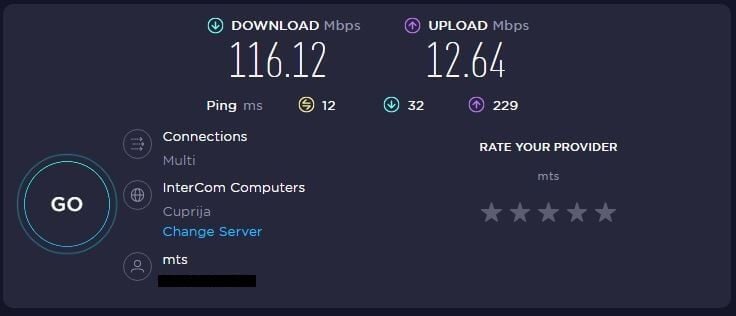
Now that you know how I do my speed tests, let me show you how well these two providers did, starting with NordVPN.
NordVPN
UK:
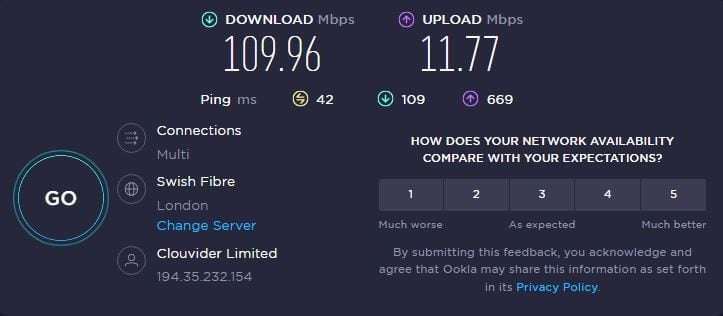
US:
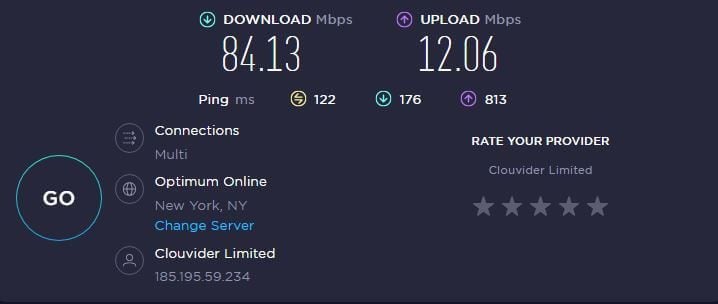
Japan:
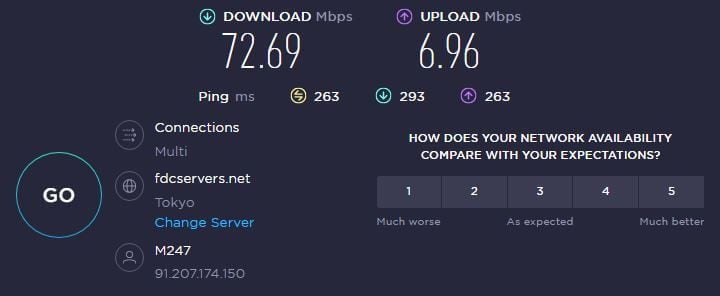
Australia:
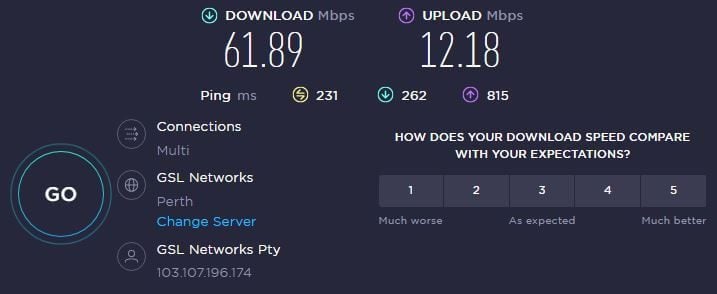
Proton VPN
UK:
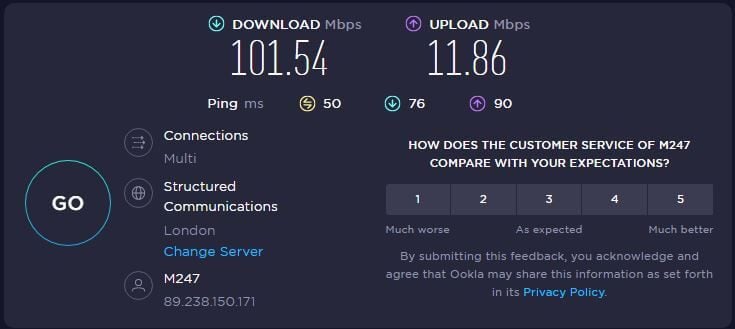
US:
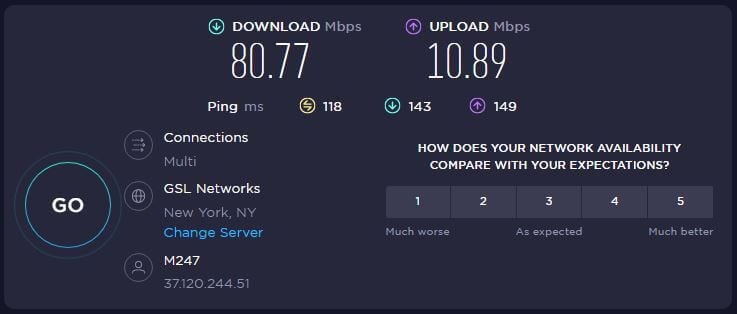
Japan:
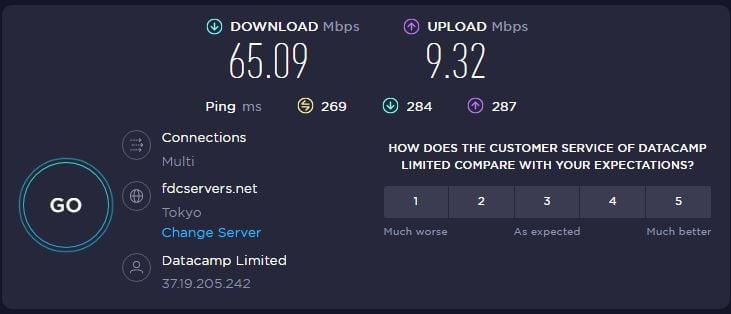
Australia:
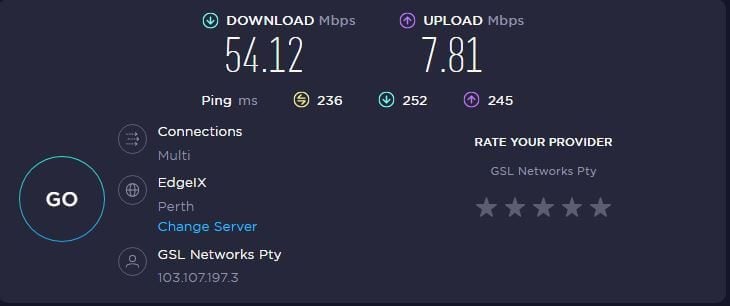
Who Wins?
Taking a look at these speed test results, I think it’s clear which VPN is faster. Needless to say, NordVPN WINS this round of the comparison, being one of the fastest VPNs in every location, in both upload and download speeds, while also having lower ping.
Proton VPN is by no means a slow provider. But you should keep in mind that it’s also not particularly fast compared to more “premium” services like this one or ExpressVPN. For the price, though, Proton VPN could be slightly faster but in 2025, that’s not the case yet.
Torrenting & P2P: Are Proton VPN and NordVPN P2P-Friendly?
Staying anonymous online while downloading torrents should be your #1 priority. However, having a FAST provider for this purpose proved beneficial many times, as you won’t have to spend a lot of time waiting for files to download.
How well did these two providers perform in this test? I’d say both of them are awesome. NordVPN has special P2P servers that you can use for this purpose. One click on the P2P icon in the server list connects you to the fastest P2P server, so you can start downloading right away.
The overall performance is excellent and I’ve barely noticed any speed losses, to be honest. I use qBitTorrent for all my downloads and when I tried downloading Linux (non-copyrighted material), the entire download was complete in a blink of an eye.
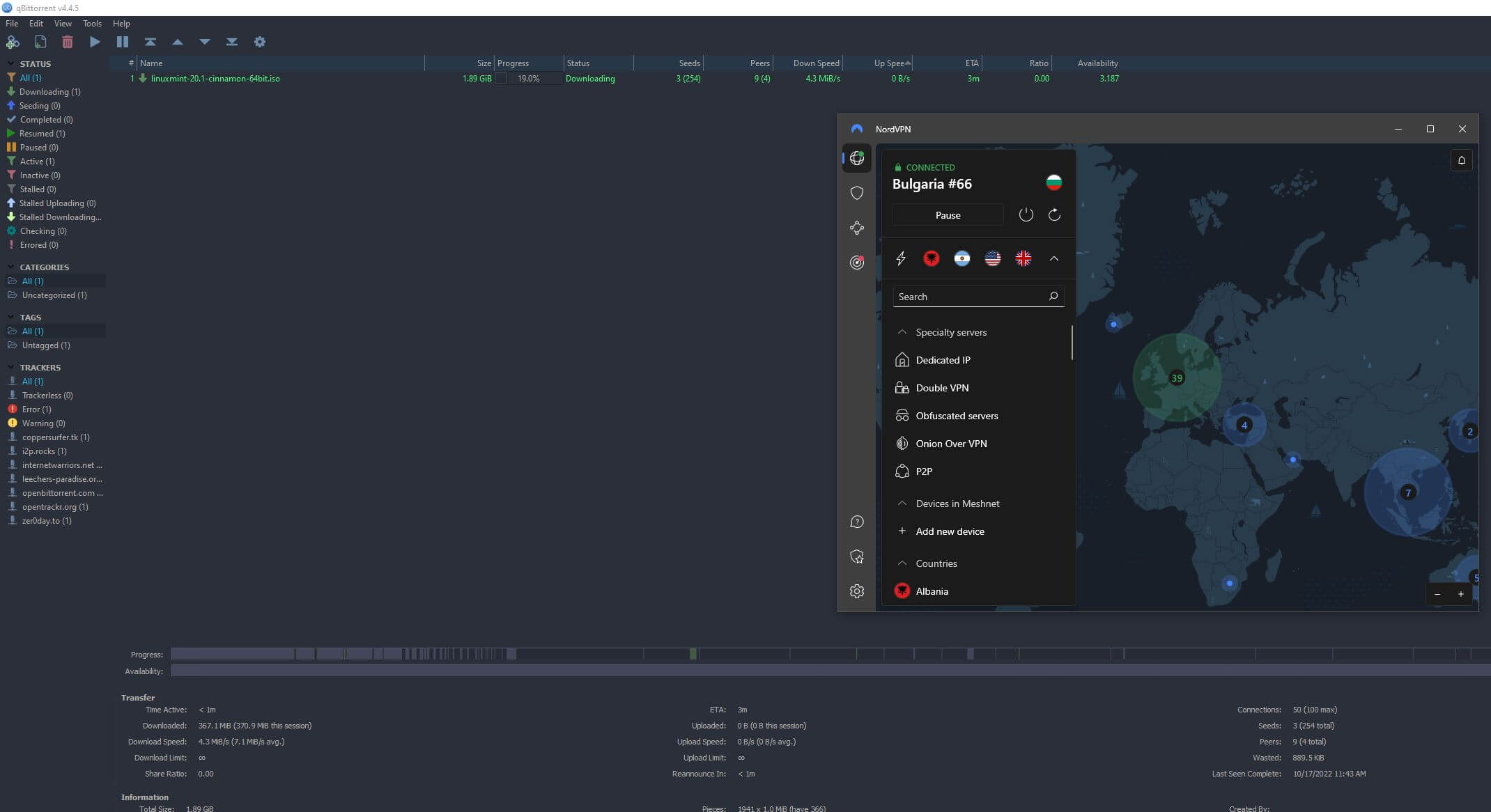
Proton VPN also offers P2P servers and you can find them in the server list by the sign next to each server or location. If you see two arrows circling around each other, it means that the particular server location or server is P2P-friendly.
Since Proton VPN doesn’t have any P2P servers in my country, I used the one in Czechia, which is pretty close to me. Although it’ll let you download torrents even if you use a non-P2P server. But, to make sure I get the best results, I still went for a specialty server.
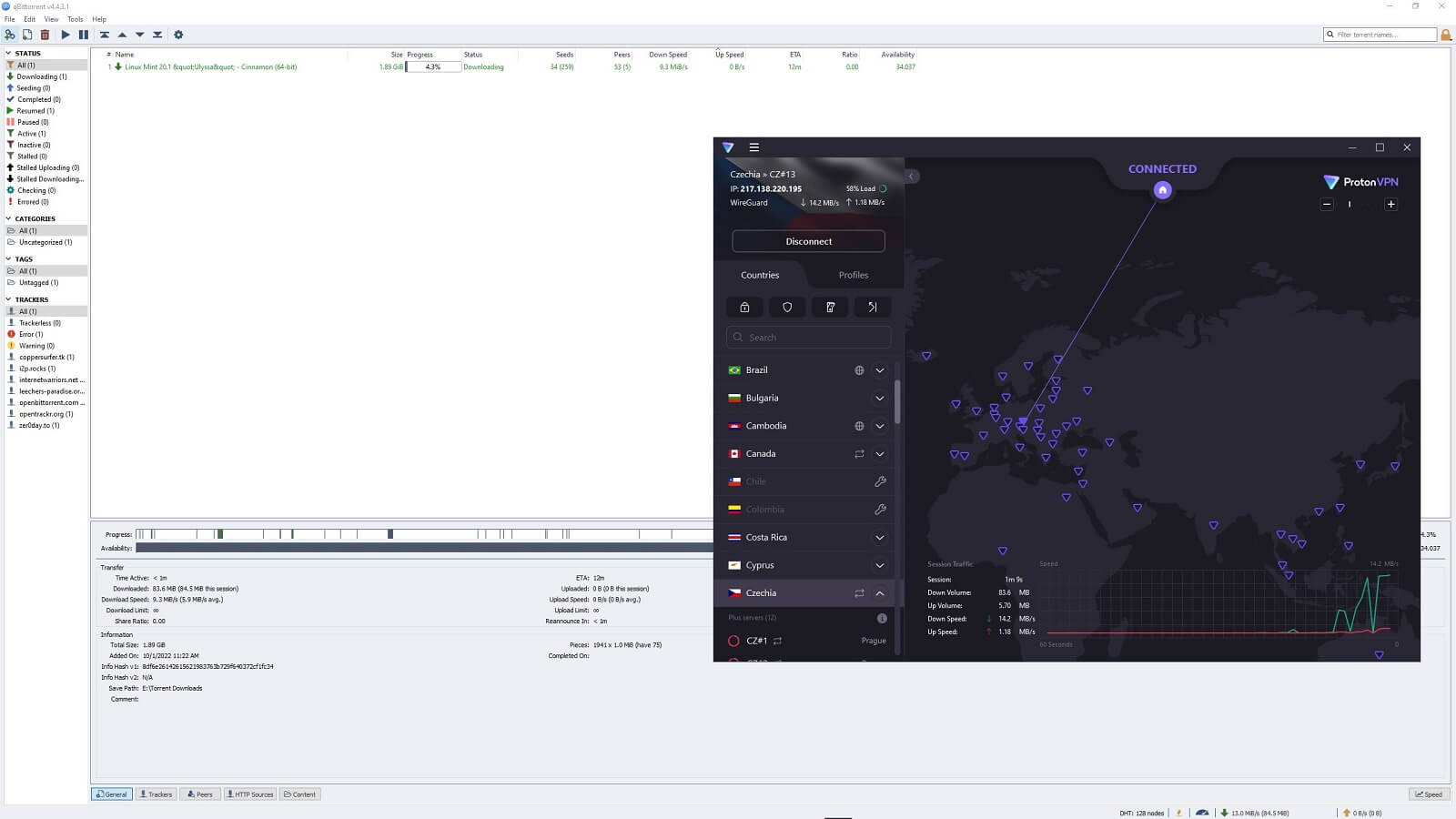
In this case, the provider showed great results, although I must admit that the performance wasn’t as great and I noticed a bit larger speed reduction compared to its rival. Is it unusable? No – far from that, but it’s not on the highest level either.
Who Wins?
Both providers are P2P-friendly and they’ll allow you to download torrents safely, anonymously, and quickly. NordVPN does have better speeds and performance and it showed better results in this test because of that, hence, NordVPN WINS this round as well.
Are NordVPN and Proton VPN Working in China?
China is one of the trickiest countries when it comes to internet freedom and online privacy. You’ve heard about the Great Firewall of China, which is a firewall put in place to prevent Chinese residents from accessing certain websites.
With 8,000+ blocked sites in the country, users are prevented from accessing Google services, Instagram, YouTube, and other popular websites. Even worse is the fact that many VPNs are blocked, rendering them useless for Chinese residents.
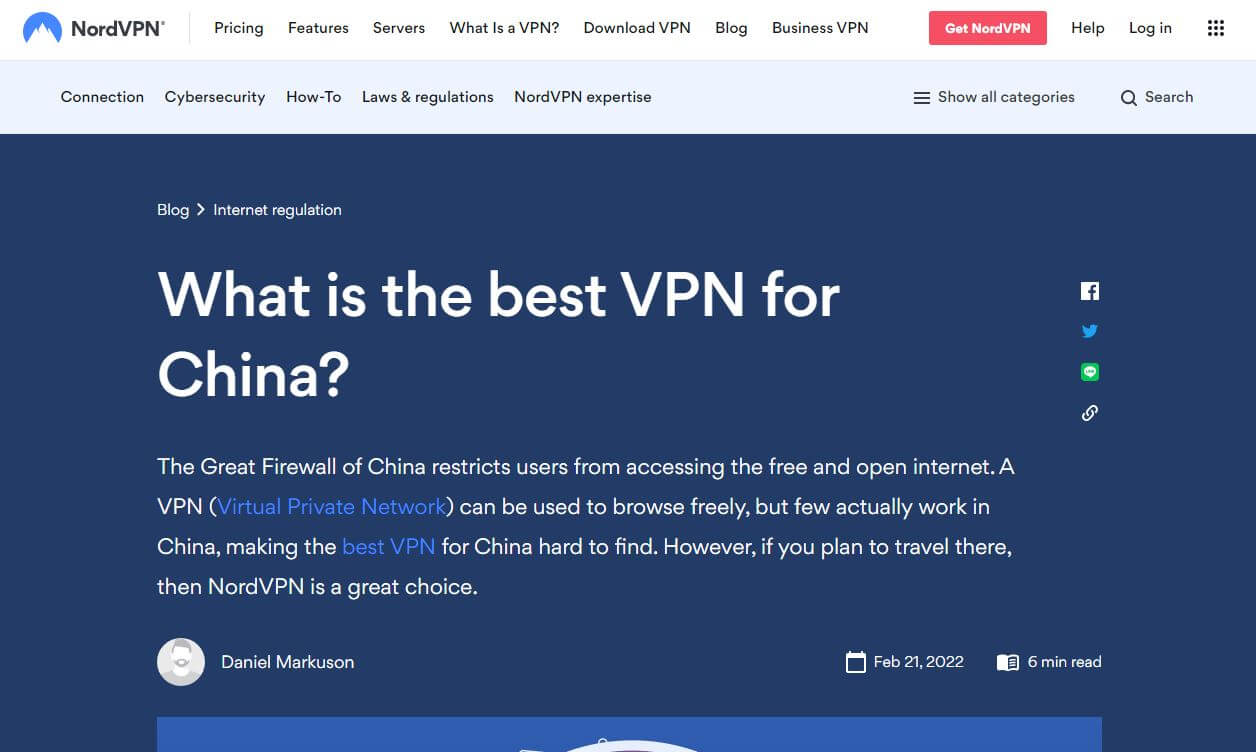
NordVPN and its obfuscated servers have shown impressive results in this country. Although I don’t live in China, I have more than a few acquaintances in this country who tested NordVPN for me and reported that it works reliably when using obfuscated servers.
These servers will make your VPN traffic look like “ordinary” traffic, which will let you bypass the Great Firewall and enjoy the internet freely in the country. Although, due to obfuscation and additional encryption, you will notice a slight speed reduction.
Proton VPN offers something called Alternative Routing and Stealth VPN which should help you bypass firewall restrictions. However, no matter what my friends in China tried, they couldn’t make it work, even with this setting enabled.
They also tried using custom DNS servers and changing the protocol, but nothing worked in the country. After all, it looks like that Proton VPN needs a lot more “firepower” to match NordVPN in this department. Therefore, if you’re traveling to China, it’s better to use NordVPN.
Just make sure you subscribe beforehand, as it’s not guaranteed that NordVPN’s site will work in this country.
Who Wins?
Having in mind that Proton VPN failed to work in China, its rival NordVPN WINS this round of the comparison, as it works reliably thanks to obfuscated servers.
Proton VPN vs NordVPN Server Fleets: Which One Is Bigger?
A big server fleet always comes in handy for bypassing geo-blocks and ensuring that no overcrowding is present in the network. It’s not necessarily the most important factor but it’s relevant nonetheless and tells you about how developed a VPN is.
NordVPN(6,500 servers in 111 countries)
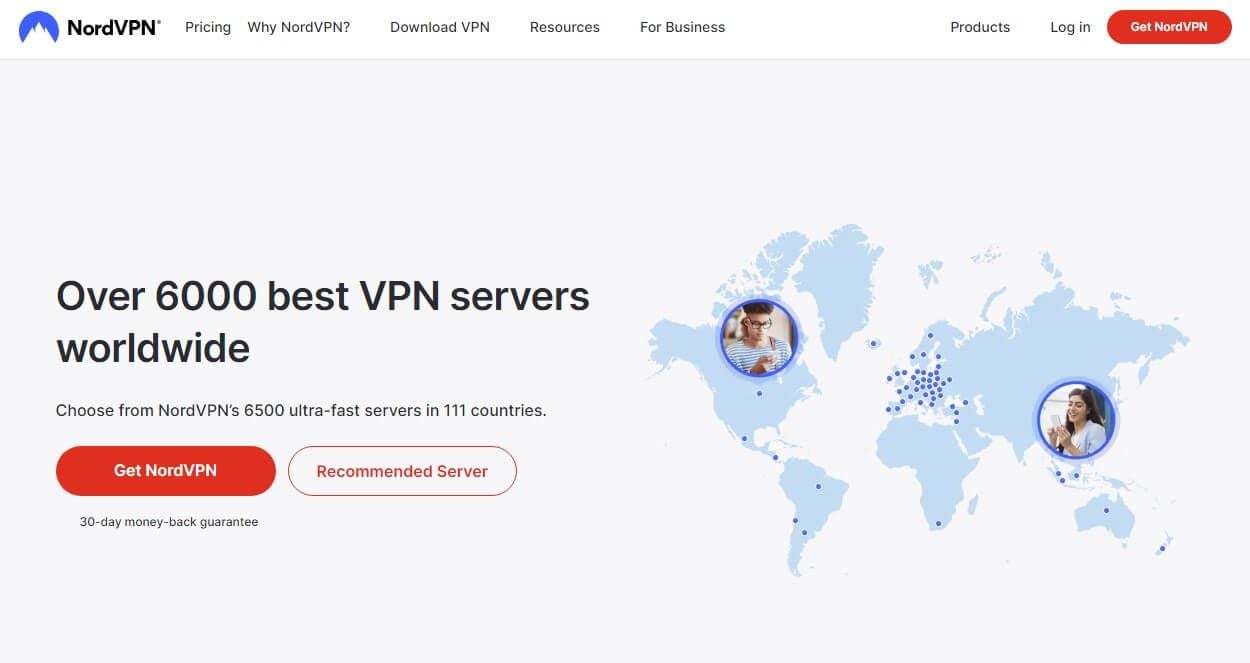
NordVPN has 6,500+ servers in 111 countries – one of the largest server fleets on the market. Not only are NordVPN’s servers fast but also well-distributed across a wide array of continents. It has servers in Africa, Asia, the Middle East, Europe, and America.
Moreover, we’re talking about 10 Gbps servers that promise and deliver top-grade performance, as you’ve seen in this Proton VPN vs NordVPN duel. The highlight of its server fleet is the presence of dedicated servers for different purposes.
I already mentioned P2P, obfuscated, and Double VPN servers. However, the provider has onion over VPN servers for browsing the dark web safely and even Dedicated IP servers in France, Germany, the Netherlands, the US, and the UK.
This makes the server park extremely usable and gives enough variety for different needs. Everything about its server network is excellent, including the server variety, performance, and network stability. That’s one of the selling points of NordVPN and that’s because it’s one of the most popular services on the planet.
Proton VPN (6,500+ servers in 111+ countries)
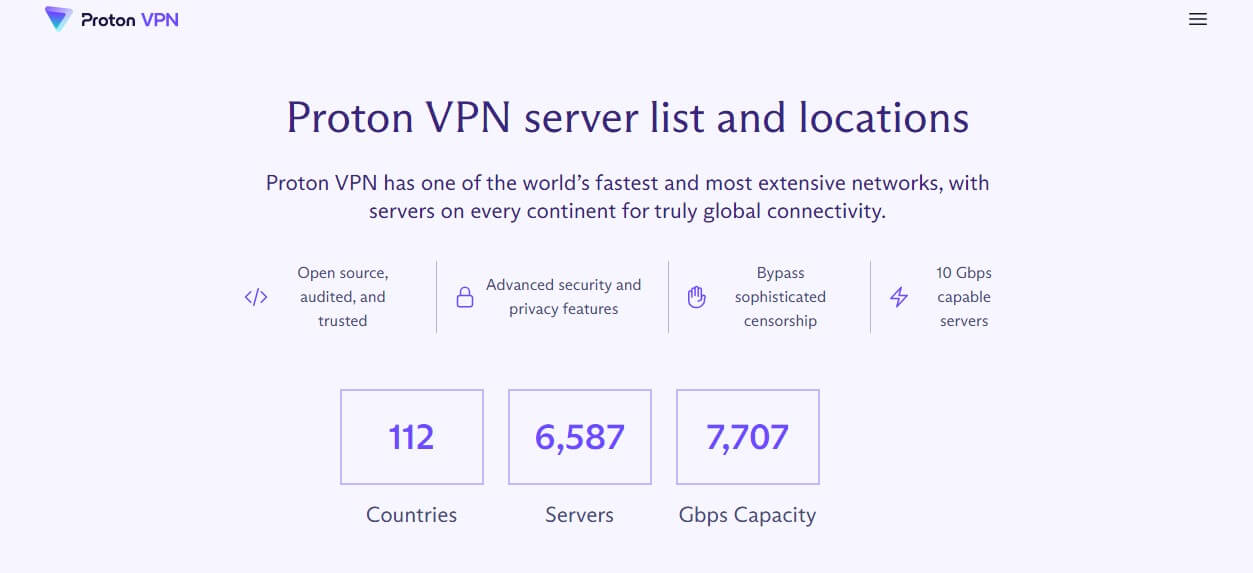
Proton VPN offers a tad over 111 countries around the globe but it has over 6,500+ servers in comparison. If we do the math, it’s pretty much the same as NordVPN, so we’re talking about a great server fleet that’s equally impressive.
On top of that, Proton VPN covers popular and less popular countries, so you won’t have any issues finding the location you want. It has servers dedicated to torrenting, streaming, and onion over VPN servers for the dark web too, so you won’t have to worry about finding the right one.
Secure Core servers are also a big thing here and Proton VPN offers quite a few locations and servers. Its premium version gives you 10 Gbps servers for the best possible performance, and if you try the best free VPN which is Proton VPN’s free version, it’ll limit you to three server locations with 1 Gbps servers.
Overall, the server network of Proton VPN isn’t as small as it used to be and you’ll most likely find it enjoyable. Overcrowding isn’t a thing here yet as the provider isn’t as popular as NordVPN and because you get 6,500+ servers, there’s plenty to enjoy
Who Wins?
This one’s pretty clear. NordVPN and Proton VPN offer a pretty much identical server fleet in terms of variety and numbers. At the time of writing, we’re talking about 6,500+ servers in roughly 111 countries, including dedicated servers on both sides. That said, this round is a DRAW.
Customer Support of NordVPN and Proton VPN: How to Contact Them?
If you’re having an inquiry or a problem with your VPN, it’s always good to have reliable and responsive customer support to help you. In my Proton VPN vs NordPVN comparison, I should go over this part because there are some key differences between these providers.
As you most likely know, NordVPN has live chat support available 24/7, along with email support, and an active YouTube channel. This makes the provider extremely easy to get in touch with and ask questions, fix potential issues, or whatever.
To that, we should add an FAQ section and a comprehensive Help Center that you can use to fix issues yourself. Proton VPN is similar in this regard. It offers great self-help methods in the form of a Help Center and FAQs but with one serious flaw – 24/7 support locked only to premium users.
In other words, there’s no live chat support where you can get help immediately, so you have to send an email and wait for a response for a few hours, up to 24 hours if you aren’t subscribed. Having in mind this is a premium VPN and not a cheap one at that, I think this is a pretty big flaw.
Who Wins?
Without a shadow of a doubt, NordVPN WINS this round of the duel, having much better customer support compared to its rival.
Pricing Comparison: How Cheap Proton VPN and NordVPN Are?
The final Proton VPN vs NordVPN comparison will talk about prices. No doubt, this is one of the most important criteria for people on a low budget looking to save money by getting an affordable provider.
I’ll start with Proton VPN first. Here are its subscription plans:
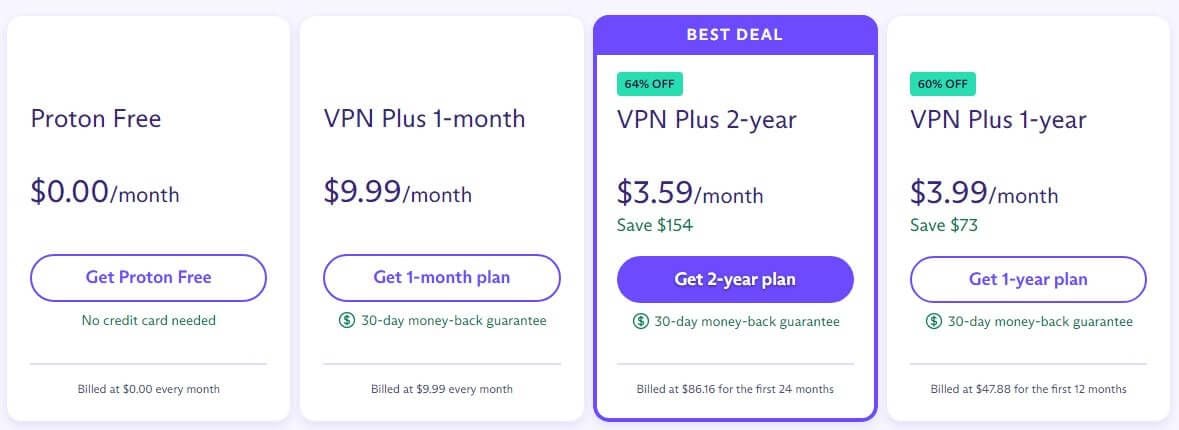
As you can see, it’s a simple pricing structure where you have 1-month- 1-year, and 2-year plans. The monthly plan is not very expensive compared to NordVPN but its cheapest plan, which is the most important one, costs $3.59 a month – a 2-year plan, of course.
It ends up being $86 for the first 2 years, so keep that in mind. Also, the provider gives you a 30-day money-back guarantee for all plans, so if you’re dissatisfied you can always get a refund. The same applies to NordVPN whose pricing you can see below:
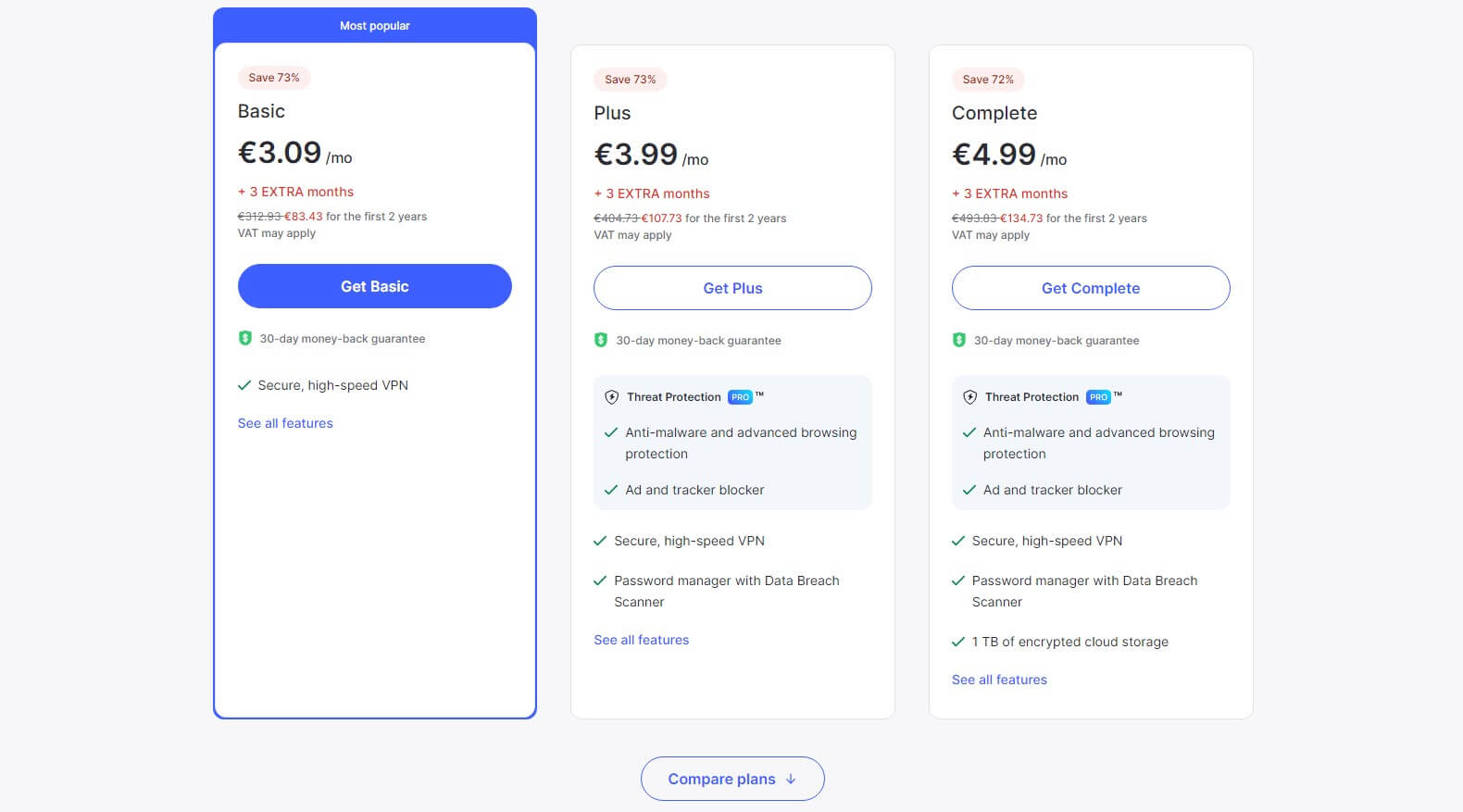
Let’s focus on the plan on the left because it’s the cheapest one and includes NordVPN’s magnum opus VPN service. As you can see, NordVPN’s 2-year plan is significantly cheaper than Proton VPN, despite NordVPN being a better provider.
If we do the math at the end of the day, the price difference isn’t negligible for some people. Even if VAT applies to your country, NordVPN will still end up being slightly cheaper, yet, it remains a vastly better choice.
Get NordVPN’s Special 2-Year Deal
Moreover, this provider is known for special deals that Proton VPN rarely has. Thus, in some instances, its 2-year plan can drop to a measly $3 or so a month, which lowers the price significantly.
Who Wins?
With that said, the conclusion is simple. NordVPN WINS this round because it’s much cheaper than Proton VPN whose prices are very expensive. That’s why we rarely recommend Proton VPN’s premium plan, as it’s overpriced compared to NordVPN or even CyberGhost.
Conclusion: NordVPN Wins!
So, let’s digress and bring our NordVPN vs Proton VPN comparison to the end. NordVPN wins this duel with a score of 9:2 which is a pretty strong win for the Panamanian provider.
Proton VPN held its ground in apps, security, and privacy. However, NordVPN is better in pretty much everything else, including performance, streaming, support, torrenting, bypassing censorship, and pricing.
Knowing that the Panamanian provider is also cheaper, there’s no reason to get Proton VPN instead. If it was a bit cheaper, it would be a fairer comparison. As things stand now, my honest recommendation is NordVPN, which ultimately wins the duel and emerges victorious. Congrats!